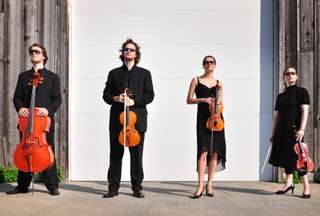|
Back
Fourth of July Clouds and Fireworks New York
BargeMusic, Fulty Ferry Landing, Brooklyn
07/04/2009 - & July 5, 2009
Antonín Dvorák: String Quartet No. 12 in F Major, Opus 96 (“The American”)
Duke Ellington: Fantasy (Three songs arranged for string quartet by Paul Chihara)
Felix Mendelssohn: String Quintet No. 2 in B-flat Major, Opus 87
Voxare String Quartet: Emily Ondracek, Galina Zhadnova (violin), Eric Peterson (viola), Adrian Daurov (cello) – Mark Peskanov (violin) 
Voxare Quartet (© Courtesy of the artists)
The Voxare Quartet is half Russian, half Chicagoan, 100 percent Juilliardian and 400 percent young, enthusiastic, blessed with individual great instrumental skills. But string ensembles are, by definition, complex organisms, and skills and backgrounds do not necessarily make great music.
Not that the Voxare was bad. In fact, in the second half ot the program through the intervention of a Russian deus ex machina (the machine being a violin), they turned in a dynamic performance for a most unlikely piece. But that comes later. The first half was a kind of patriotic choice for the BargeMusic annual Fourth of July concert, and here certain problems arose.
Part of the quandary is that the BargeMusic acoustics and proximity to the audience is so intimate that the most intangible microscopic problems of intonation are picked up and magnified to the public. From their respective histories, these young players hardly have those problems, but from the first measures of the popular Dvorák “American” quartet, one felt a very slight blurring of the lines, as if each player was trying so hard that the music was more self-conscious than coalescent.
That might work in other pieces, but Dvorák presents the challenge of providing two energies. The American energy, which the composer loved so well; and the energy of the Czech genius who had overcome that Germanic prejudice of the time, and exult in his native folk dances and whirling village musicians.
That problem can be solved through enthusiasm, freshness and vitality. What Voxare produced here was a thoughtful honest performance. Dvorák loads up the score with far more markings than most older composers of the time, and Voxare takes these markings most seriously. They shaped each phrase for optimal effect, but one could hear the thought and care behind it. Not always the music
The music could not be considered restrained. The outer dance movement and the scherzo were both taken with poise and feeling (with some wonderfully fresh playing by First Violinist Emily Ondracek). They played the Lento with some lilting good grace, and were very careful in the finale metrical markings.
But the “American” quartet needs an immediacy, the spontaneity which comes with experience. Their two years together shows great potential, but in the “American” quartet, one felt less energy than (sometimes admirable) great care.
The following American work was more home-grown. Three of Duke Ellington’s songs were harmonized by Ellington specialist and Hollywood composer Paul Chihara, the technical consultant to the show Sophisticated Ladies. I must offer a personal prejudice that I don’t like classical arrangements of pop or jazz any more than I like Barbra Streisand singing Debussy, which she does, or the Mahler Symphony of a Thousand arranged for tenor sax and Leadbelly-style guitar.
(The only exception was the rare album, “Fats Domino Sings Scarlatti Ariosos” but that is for another day.)
Ellington’s arrangers came directly from his band and no amount of string playing can come near the swinging sound of their orchestral color. Django Reinhardt was a singular player. A quartet of would-be Reinhardts is not easy to bring off.
What might have been missing in the first half was rectified—no, it became an unalloyed triumph—with the addition of another violin in the Mendelssohn second Quintet.
Mark Peskanov is a regular performer at BargeMusic, but his professional career has given him more than technique. His authority, his incredible energy and his leadership resurrected the Voxare beyond recognition.
Granted, Mr. Peskanov is so energetic that his virtuoso violin playing overcame the other members, and he took the Adagio sostenuto movement at Andante pacing. (That was fine with me, since it brought out the delightful tango syncopation.)
Also, looking at the score, it was obvious that Mendelssohn was writing for violin soloist and four “others”. But this made no difference. Mr. Peskanov took those four players along for a high-voltage ride from the first exuberant movement to the last.
The boundless amperage was infections and sizzling, and those individually fine Voxare players finally consolidated into the fireworks of a splendid joyous ensemble.
Voxare Quartet’s website
Harry Rolnick
|